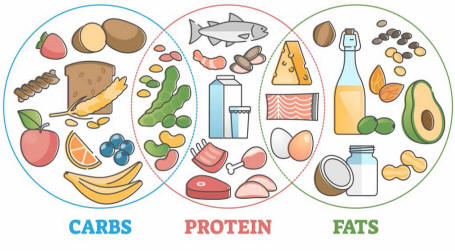Healthy Eating

Early Childhood and Nutritional
Impact Early childhood is a critical period for the establishment of eating behaviors that can impact long-term health outcomes. Children’s physical, cognitive, and emotional health is greatly influenced by the nutrients they receive in their diets. Nutrients such as carbohydrates, proteins, and fats are essential for growth and energy, while micronutrients (vitamins and minerals) support various physiological functions, including immune system function, cognitive development, and bone health. Research suggests that children who are adequately nourished during the early years tend to have better health outcomes in adulthood, including a lower risk of developing chronic diseases like obesity, diabetes, and heart disease.
Evidence indicates that children who consume a well-balanced diet, such as more vegetables, fruits, lean proteins, healthy fats, and whole grains, are more likely to achieve optimal physical development and emotional well-being. On the other hand, poor nutrition during childhood can result in deficiencies that could negatively affect growth, cognitive development, and emotional regulation. For instance, deficiencies in vitamins and minerals such as iron, zinc, and vitamin D have been linked to developmental delays, learning difficulties, and emotional disturbances such as anxiety and depression.
Parental Influence on Healthy Eating Habits
The role of parents in shaping healthy eating behaviors during early childhood cannot be overstated. Studies have shown that children whose parents model healthy eating by providing a variety of nutritious foods to their children and avoiding pressure or forcing their children when it comes to their food consumption are more likely to develop healthy eating habits. Parents also play a significant role in regulating their children’s exposure to food choices, shaping their preferences, and fostering a positive relationship with food.
Balancing Macronutrients and Micronutrients
Proper nutrition involves a delicate balance of macronutrients and micronutrients. Macronutrients—carbohydrates, proteins, and fats—are required in larger quantities and are essential for growth and energy. Micronutrients, such as vitamins and minerals, are needed in smaller amounts but are equally crucial for maintaining optimal health. Micronutrients, including iron, zinc, calcium, and vitamin A, help support various biological processes, including immune function, energy production, and mental health. A deficiency in any of these nutrients can have long-lasting consequences. For instance, iron deficiency in children can lead to anemia, which can cause fatigue, weakness, and cognitive delays. Similarly, inadequate intake of essential fatty acids like omega-3s, found in fish, can result in poor brain development, affecting attention, memory, and mood regulation. This highlights the importance of balanced nutrition, as both macronutrients and micronutrients work together to promote optimal health.
Additionally, plant-based foods contain phytochemicals, which are naturally occurring compounds that have antioxidant and anti-inflammatory properties. These compounds, while not essential for energy or growth, can also contribute to long-term health by reducing the risk of chronic diseases.
Preventing Childhood Obesity
Establishing healthy eating habits in early childhood is critical in preventing obesity. The prevalence of childhood obesity has been steadily rising worldwide, leading to significant concerns about the future health of children. Obesity is associated with an increased risk of developing various chronic conditions, including type 2 diabetes, heart disease, and certain cancers. Healthy eating behaviors can be reinforced through consistent practices at home, schools, and communities. Programs focused on healthy eating, active living, and obesity prevention have shown promising results in reducing childhood obesity rates. For instance, large-scale interventions in Australia have highlighted the positive effects of community-based programs and the involvement of parents in teaching healthy habits to young children. These programs emphasize the importance of reducing processed food consumption, encouraging physical activity, and creating supportive home environments that prioritize nutritious meals.
Furthermore, promoting a “balanced week” rather than a “balanced meal” allows for greater flexibility in encouraging children to try new foods and build healthier long-term eating habits. Reducing pressure during mealtime and setting realistic goals can also help alleviate the stress parents face when their children go through picky eating phases, making mealtimes a more enjoyable experience for the entire family.